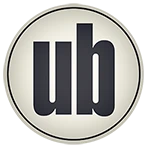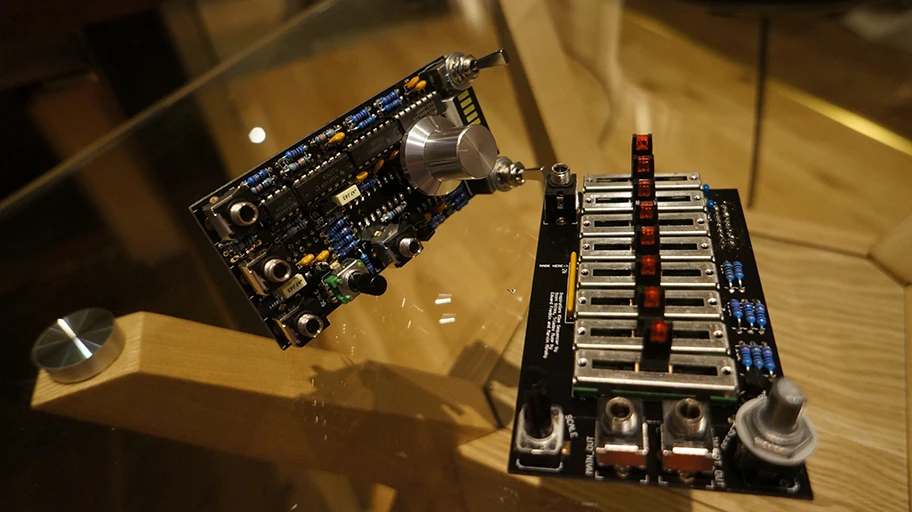Drums are a problem in a hobby band. You pretty much need drums, it is hard doing without. Yet, with most drummers, drums are gonna cage you in a wall of noise. Because everybody needs to pump his volume to the natural – and substantial – level of a drum set that is played once a week to beat out the steam built in a 9to5 life.
I managed to persuade our last drummer to play an e-drum set. These things can be turned up an down in volume as desired. You still need a certain volume to have the sound of the drum synth drown out the tapping noise of the sticks on the pads. But it is a huge step forward from an aggressively played acoustic set. Our drummer loved it. And she herself made an amazing progress on that set in our band. Having played only two years when joining us, she learned to create complex drumscapes in the following years. She kept our beat, but she also contributed significantly to the highly varied sounds of our songs.
She taught me the potential of this instrument. The drum synth. Sadly she recently left our band due to personal reasons. And I'm sick of having to deal with the noise. So I checked my options.
I admire the looper musicians out there on Youtube. Like The Petebox, godfather Beardyman and the horde of hobbyist, semi-pro loopers filling Youtube with amazing music. And I'm fascinated by the dubstep musicians who finger-drum rhythms live on 16 pad dynamic drum pad arrays. I like that hand-drumming and with looping I could create a rhythm, loop that, and then sing to that. With the right audio gear, we will be able to loop other material as well.
My band has no bass player, either. That part is taken by the keyboarder, whose left hand is our bass. Now that often occupies him more, than he wishes. That, too, lends itself to looping. The keyboarder can loop the repetitive bass line and devote himself to more complex melodies in higher scales.
But we are not there, yet. The first thing, I got, was a simple midi 8 pad array. For 40 bucks I could play arbitrary drum synths on my everyday laptop. I'm a Linux enthusiast, so all the software I used was free, but worked extremely smoothly. I plugged the drum pads into the USB port, fired up the free Hydrogen drum synth and sequencer and immediately started finger drumming on 8 pads. That's actually more than I can technically handle. Still I got a better array, 16 pads, better dynamics sensitivity, 150 bucks.
I also fooled around with – free – looper software on my laptop. But you cannot finger-play drum-pads and control the looper with you fingers at the same time. You need a foot-switch. Therefor the 16 pads array was also chosen to allow the attachment of a pedal. That is actually supposed to control a kick drum, but I used it to control the looper. Some 9 bucks for the pedal. But that was only for evaluation. I knew, if this turned out to show promise, I'd need more elaborate foot control than one pedal. So after I was confident, that this would work in the band, I invested another 150 bucks for a ten midi foot switch array. Now I can record, erase, overdub, undo and redo loops with a tap of my foot. And I can tap in multi-instrument rhythms with the fingers of my left hand. For sure, all this currently puts me in a mighty overextended position in the band. But I'll learn.
That's already an amazing instrument for 300 Euro and some CPU time of the laptop I also use to do my work … and 49 bucks research money for the 8 pad array and the pedal to evaluate the options. But I hope it is just the start. We want to loop our guitar and keyboard as well, but need some pro-audio gear for that. At the very least a serious USB Audio interface for my laptop. But these things are all USB 2 and my laptop only has USB 3 ports. And this can be a problem. Now our guitarist proposed to build a 19” rack compatible computer dedicated to that task.
We have a recording PC in our rehearsal room. I built it 10 years ago. You can do multi-track recording with that thing, and I'm proud of it. It was built at a time, when you needed a real-time optimized Linux kernel to do 8-track recording on consumer grade – cheap – hardware. But that machine is a far cry from the timing performance required to do live audio processing.
Ten years of Moore's law later, with a computer built for that task this will be no problem. And a rack-mountable one, that will blend in with the other audio gear. And it will become yet more. Here's my plan.
A friend of mine has lots of experience custom building PCs. I did that, too, several times, but you need to have up to date knowledge of component compatibility, performance choke points, and sweet price points. Together with my friend we have the know how to devise a cheap machine with amazing capabilities.
We'll put consumer ATX components into a 19” rack mountable ATX housing. It will be essentially a rack mountable PC. Consumer hardware in the disguise of a rack server. The hardware will be optimized for allowing to stream lots of sound data through its bowels and to its mid-sized fast SSD storage. The CPU will be sufficient to do some real time synthesizing and effects processing. And it will be relatively silent – usual server grade fans make much too much noise for audio recording.
The machine will have a pro audio sound-card which supports ultra low latency audio processing in the order of a handful of milliseconds – probably from German specialist RME, but that has not been decided yet. Attached to that sound-card will be an 19” rack-mounted 8 port AD/DA converter that converts sounds into bits and vice versa. The sound-card will be chosen to allow extension with at least another 8 converters but one set of 8 is ample for starters. And the sound-card will obviously have a midi input port.
All this, computer, sound-card, AD/DA converters will amount to less than 1000 Euro.
I plan to also purchase some midi DAW controller for another 150 bucks or so. This will be attached to the audio machine and will turn it into a live audio mixer. The low latency of the audio system is of paramount importance for that use case. When this is used as the standard mixer for the band then it will be possible to do on the fly multi track recording by pressing some buttons on the mixer. This is a great step forward from my previous, rather cumbersome setup for multi track recording.
I plan to set the system up to automatically launch the mixer software on start-up. When a USB storage is attached a script will automatically launch that copies the latest recordings unto the storage. Erasing old recording to make room for new ones will be done with the press of a button. It will be a no hassle customizable audio machine.
Having the audio machine doing the mixing also allows adding arbitrary effects on the fly. Reverbs, compressors, various distortions – modern Linux audio offers hundreds of high quality audio plug-ins that can easily be added to the processing chain of the mixer software. That alone provides a value of many thousand Euros if the effects had to be purchased separately. Plus the comfortable multi-track recorder, plus drum synth, plus the generic looper plus a plethora of things I have not even dreamed of.
If you add the midi peripherals I already purchased and the DAW controller I plan to add, too, you end up with some 1500 Euros. What you get for that money is breathtaking value, amazing flexibility and all in the perfect form factor. And all this is achieved by combining off the shelf consumer hardware with the flexibility of free software.
We are fast entering the age of maker's paradise. Another example is small arm based computers. You can get versatile computers the size of a thick smartphone for some 50 bucks including housing and everything required to get your new business idea up and running. You get 3D printers and all kinds of brilliant hardware for ever smaller money. The future has finally arrived. Lets go, pluck it.
Epilogue
I built that computer with my friend. I practiced some and am currently able to loop drums, base and git. When stanza/refrain/bridge rotate, switching the loops fast enough with the foot pedals is a hassle. I'll need to introduce some advanced MIDI-programming there. I skipped the DAW controller for now. The complexity of the internal audio-routing is quite impressive already. Adding the controller would make it overwhelming. I need more practice.Bugs and hardware limitations nudge the usability just below that point where it may become feasible for non-technical users. I experimented with simpler set ups which might still be interesting for non-technical users. I also talked to and demonstrated things to other non-technical musicians. I considered spinning a simple product off – like a laptop-loop-mixer-arranger for 350 bucks all hardware included. This would allow people to create loop based music at home, arranging and mixing loops, adding effects and so on. But getting the system to the point, where the UX is really adequate for non-techs would imply quite some effort for which I do not really have the time. If there were obvious broader interest in something like that, I might reconsider …



